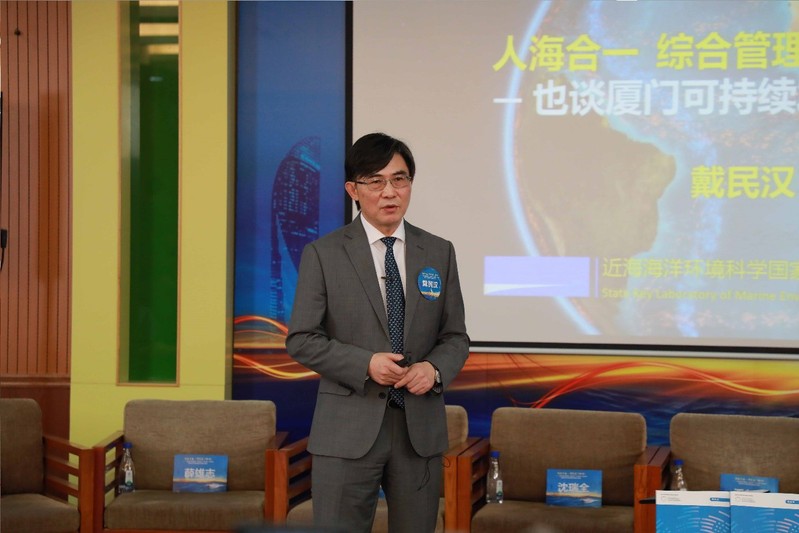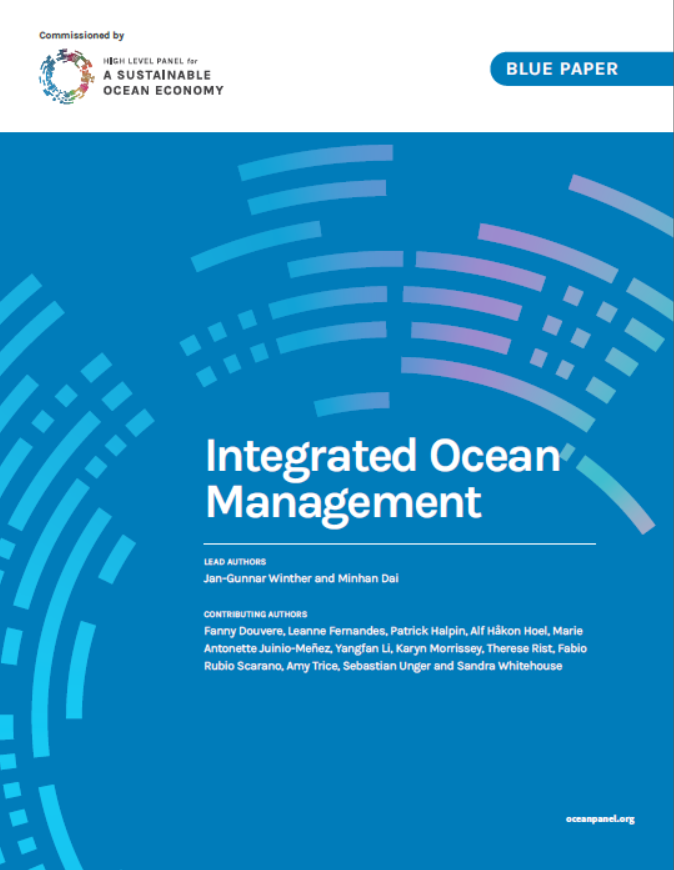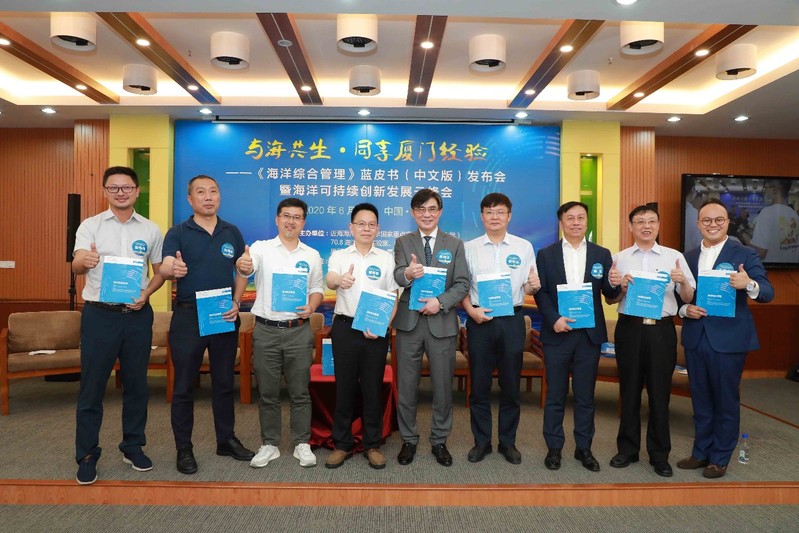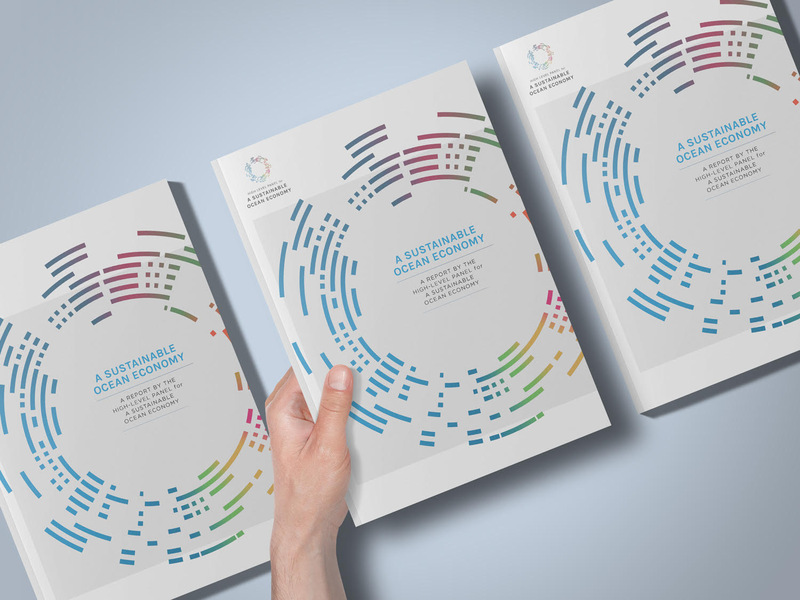“The ocean will be a primary source of food and other resources for human society eventually. We urgently need to adopt an integrated and holistic ocean management approach with the best available science to underpin decisions for a sustainable future,” said Dr. Dai Minhan, chair professor of marine biogeochemistry at Xiamen University, during his keynote speech for the live stream event "Promoting Integrated Ocean Management for a Sustainable Ocean Economy: The Case Study of Xiamen" held on June 8, 2020, World Oceans Day.

Blue Paper: Integrated Ocean Management
The Blue Paper on Integrated Ocean Management (IOM) was commissioned by the High Level Panel for a Sustainable Ocean Economy (the Ocean Panel, for short), and led by Dr. Jan-Gunnar Winther, director of the Centre for the Ocean and the Arctic, Norway and Dr. Dai Minhan. Twelve global experts from 11 institutions served as contributing authors, including Dr. Li Yangfan, a professor of coastal urbanization and environmental studies at Xiamen University. This paper is part of a series of 16 commissioned papers and was published on May 20, 2020. Five recent ocean management success stories were described in the paper – from Norway, the United States, China (Xiamen), the Coral Triangle, and the Seychelles – each of which demonstrated that delivering much needed long-term ocean health and wealth can be achieved using integrated ocean management. It also assessed current opportunities to accelerate the progress and impact of said opportunities on jobs and equity. The paper advances six opportunities for action to enhance global ocean governance through improved IOM, including: harnessing science and knowledge, establishing partnerships between the public and private sectors, strengthening stakeholder engagement, improving capacity building, implementing a regulatory framework, and developing adaptive solutions.

The Case of Xiamen, China: Balancing Protection with Production
Integrated ocean management aims to support a sustainable ocean economy that uses ocean resources in ways that preserve the health and resilience of marine ecosystems and improves livelihoods and jobs. In other words, balancing protection and production for prosperity. To achieve this goal, relevant stakeholders from government, business, civil society, and various ocean industry sectors are brought together and an ecosystem and knowledge-based approach adopted.
As the only city-scale case, Xiamen’s 25-year experience with integrated coastal management (ICM) was highlighted. Xiamen implemented a new coastal management system in 1994, which had an integrated coastal management leadership group consisting of the mayor and sectoral officials and experts along with an ocean office to coordinate ocean-related issues within aquaculture, transportation, construction, and science and technology. Over the past 25 years, Xiamen has transformed from a small coastal community into an international port city. The marine economy has now become the economic growth pole of Xiamen’s future development. With that, Xiamen has had its integrated coastal management (ICM) practice listed as a PEMSEA (Partnerships in Environmental Management for the Seas of East Asia) demonstration site since the 1990s. The Xiamen ICM Model, including essential elements such as legislation, institutional arrangements, an integrated and holistic approach, science-based decision making, financing, stakeholder consultation, and capacity development, was summarized with global implications.
In this ever-evolving process, Xiamen University scientists have engaged in scientific research and provided support to aid decision making and professional personnel training. For instance, Dr. Hong Huasheng was the first group leader to chair the Marine Expert Group for Xiamen ICM Implementation in 1996. She worked closely with other marine experts to apply solid science and technical solutions to various areas including (but not limited to) marine spatial planning, ecological rehabilitation, and payments for marine ecosystem services. Since 2000, there has been a group of Xiamen University scientists involved and contributing to Xiamen’s ICM practice.
Insights from 8 Invited Guests: Innovation for a Sustainable Ocean
The Chinese version of the Blue Paper was released through a live broadcast via various platforms on June 8, 2020. For World Oceans Day 2020, the UN’s theme placed the global spotlight on ‘innovation for a sustainable ocean’ with highlights including ocean solutions and entrepreneurship, science, technology, and the blue economy. Given this, 8 guests from academia, local government, business, and non-governmental organization (NGO) were invited to attend this live-show and shared their insights on how to effectively manage the ocean with pressing challenges (e.g. climate change) towards a sustainable ocean economy.
Ÿ Pan Xinchun, Secretary-General of the China Oceanic Development Foundation, spoke on integrated ocean management practices in China at the national, provincial, and local levels. There are experiences to share but also challenges to be addressed in China.
Ÿ Lin Huaiyuan, Engineer-in-Chief for the Xiamen Municipal Bureau of Ocean Development, elaborated the 25-year ICM journey in Xiamen, and shared good practices.
Ÿ Shen Ruiquan, Planner-in-Chief for the Xiamen Municipal Natural Resources and Planning Bureau, introduced Xiamen’s experience in taking the lead in implementing marine functional zoning and spatial planning to create a solid basis for ICM practice.
Ÿ Xue Xiongzhi, Professor at the Fujian Institute for Sustainable Oceans, deemed “best available science” as one of the essential elements underpinning ICM practice in Xiamen and beyond.
Ÿ Chen Bin, Vice President of the Shanghai Zhenhua Heavy Industries Co., Ltd. (ZPMC), elucidated a market-driven sustainable business strategy that ZPMC adopted, which not only considers the demands of consumers, but also takes ocean sustainability into account.
Ÿ Ma Jian , Vice President of The Paradise International Foundation, discussed the unique role that NGOs play in the process of developing a sustainable ocean economy.
Ÿ You Weiwei, Deputy Director of the 70.8 Media Lab, demonstrated an emerging need to create novel approaches and adopt innovative means to promote citizens’ ocean literacy, which will eventually contribute to a sustainable ocean.

This virtual event was jointly organized by State Key Laboratory of Marine Environmental Science (MEL), the 70.8 Media Lab, the Fujian Institute for Sustainable Oceans, Xiamen Municipal Bureau of Ocean Development, the Xiamen Municipal Natural Resources and Planning Bureau, Sina Xiamen, China Oceanic Development Foundation, and The Paradise International Foundation. It was moderated by Dr. WANG Guihua, Special Coordinator for Development in the Faculty of Earth Science and Technology at Xiamen University, and viewed by over 225,000 participants through various channels, including NewsCCTV, VideoCCTV, Tencent Live, and Sina Weibo.
About the High Level Panel for a Sustainable Ocean Economy
Established in September 2018, the Ocean Panel is a unique initiative of 14 serving heads of government committed to catalyzing bold, pragmatic solutions for ocean health and wealth that support the Sustainable Development Goals (SDGs) and build a better future for the people and the planet. The Ocean Panel has commissioned a series of ‘Blue Papers’ to explore pressing challenges at the nexus of the ocean and the economy. These Blue Papers summarize the latest science and state-of-the-art thinking in innovative ocean solutions in technology, policy, governance, and finance that can help accelerate a move toward a more sustainable and prosperous relationship with the ocean.

Further reading:
To access the full text, please visit https://www.oceanpanel.org/blue-papers/integrated-ocean-management.